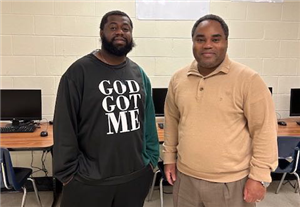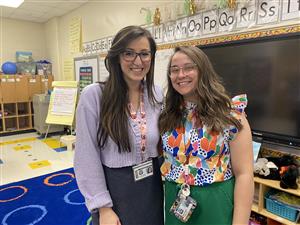The value of mentorship among beginning and veteran teachers
 When Rodriques Clark first stepped into Ranson Middle as a beginning teacher, he was greeted by Elijah Watson — a fellow Career and Technical Education teacher, and his mentor.
When Rodriques Clark first stepped into Ranson Middle as a beginning teacher, he was greeted by Elijah Watson — a fellow Career and Technical Education teacher, and his mentor.
“He came and told me, ‘Don’t worry about anything; I got you,’” recalled Clark. “From that point on, he’s been spot on.”
The North Carolina Beginning Teacher Program is a required, three-year introduction program for beginning teachers. It was created to provide a systematic structure of support for beginning teachers in their first three years of teaching so that they meet the state’s professional teaching standards, according to the North Carolina Department of Public Instruction.
In 2018, Charlotte-Mecklenburg Schools created a dedicated department — Beginning Teacher Development and Support (BTD&S) — to focus on and design a program that would provide direct support to its beginning teachers and align with state requirements.
Through the BTD&S program, beginning teachers are typically paired with a mentor in the same grade level and/or subject area at their schools. There are nearly 1,500 teachers who serve as mentors to over 1,800 beginning teachers in the district.
Mentors have to have completed three years of successful teaching and meet performance expectations. Staff in the BTD&S department also visit schools, observe beginning teachers and provide them and their mentors with feedback and resources to help them be successful.
“Our mentors are like the silent soldiers working behind the scenes and take so much off of school leaders too,” said Renee Golz, director of BTD&S.
Clark is now in his third year at Ranson and credits Watson for helping him navigate his way through the district. Now, Watson and Clark consider each other “brothers for life.”
“He gives me good advice,” said Clark. “There’s no way I’d be sitting in this position, in my third year at Ranson, without him.”
The mentor program also serves as a great retention tool. Golz said once beginning teachers are in their third year, they will ask them to consider being mentors themselves. From year to year, Golz said their mentor retention rate is around 92.2%.
“It’s promising because we feel that the efforts we’re making [to incentivize the role] are helping,” said Golz. “It also shows the dedication of our mentors.”
 Vanessa Smith and Marion Sutton both teach first grade at Croft Community School. Sutton is in her second year at Croft, and she and Smith meet daily for team planning but at least once a week to meet as mentor/mentee.
Vanessa Smith and Marion Sutton both teach first grade at Croft Community School. Sutton is in her second year at Croft, and she and Smith meet daily for team planning but at least once a week to meet as mentor/mentee.
“Education is a hard field, and you need people who have your back and want what’s best for you,” said Smith. “It’s really nice to have a big network to lean on and have someone you can easily go to.”
Sutton is currently in the CMS Teaching Residency program and is working on her edTPA — a performance-based, subject-specific assessment and support system used throughout the nation to measure and support the skills and knowledge all teachers need from their first day of teaching.
She and Smith work together to ensure she’s on track to complete her requirements.
“I’ve been very blessed to have two good mentors since I’ve been here at Croft,” said Sutton. “There’s no judgment, and I’m comfortable going to Sutton for questions I have both in and out of the classroom.”
“Our mentors go above and beyond their role as a teacher,” said Golz. “We research mentorship quite often, and we know the power behind the relationship when it works. [Our mentors] are keeping teachers in the profession.”

